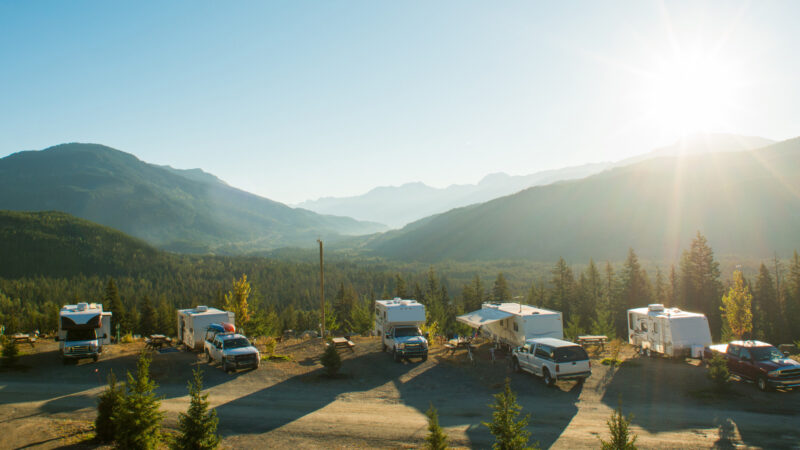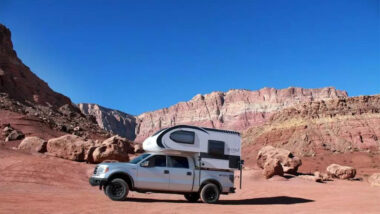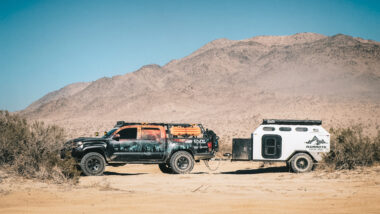Table of Contents Show
Some campground owners have been around the block enough times to see almost everything related to RVs. If you can chat with one, they can be a wealth of information.
We recently saw a video on Facebook from a content creator interviewing the owner of a local campground. In the video, they reveal the most common issue they see with RVs in their campground. What they consider the biggest issue might surprise you.
Let’s take a look!
Mobile RV Tech Services Interviews Campground Owner
Steve Puvalowski is a certified RV inspector and technician. He and his wife, Erika, are full-time RVers who create videos and content to educate others about RVing. Some of their most popular videos help owners complete DIY repairs.
However, their short clip of Michael Eller, the owner of Oscoda/Tawas KOA Holiday, racked up more than half a million views. The quick video gives RV owners some helpful information to avoid one of their most common electrical issues.
Owner States Power Problems Are Common With 30 Amp RVs
Eller shared that their most common electrical issue relates to 30-amp RVs. They roll into the campground on a hot day and plug in their rig. Shortly after they start setting up camp, the breaker will trip.
He shares that this typically occurs because the RV pulls up to 37 amps on a 30-amp breaker. It can take handle it for a decent amount of time, but it’ll eventually throw in the towel and pop the breaker.
RVers turn on their air conditioner, water heater, and refrigerator all at the same time. Unfortunately, these power-hungry devices are too much for a 30-amp connection to handle when used simultaneously.
Puvalowski closes the video by reminding viewers to keep their watts low to avoid this common issue.
What’s the Difference Between a 30 Amp and 50 Amp RV?
The difference between a 30-amp and a 50-amp RV is how much electricity you can use. A 30-amp RV can use up to 3,600 watts, while a 50-amp gives you up to 12,000 watts. As you can see, these are very different numbers.
To put this into perspective, a 50-amp RV can run two air conditioners, a refrigerator, and a microwave simultaneously. If you’re not using the microwave, you can use three air conditioners simultaneously while keeping your refrigerator cold.
If you camp during the summer, the more air conditioners you can run, the better. Most campers stand little chance against the intense heat from the sun.
Keep in Mind: Learn how to safely install a 30 amp RV plug at home!
How Many Appliances Can a 30 Amp RV Run?
So what about a 30-amp RV? Unfortunately, the 8,400-watt difference between the two is pretty significant.
If you have a 30-amp RV, it’ll require you to manage your power usage. You’ll have to choose between running your air conditioner or microwave while running your refrigerator.
Microwaves and air conditioners require a tremendous amount of energy. An RV air conditioner can use upwards of 2,400 watts, 66% of your available electrical capacity. This can make preparing meals challenging. And you’ll have to turn the A/C off if you need to use the microwave.
Tips for Avoiding RV Power Issues
Want to avoid RV power issues? Here are some tips to help you enjoy uninterrupted power to your rig.
Inspect the Electrical System and Outlet
One of the first things you should do when you arrive at a campsite is to inspect the electrical pedestal. Unfortunately, some campgrounds do a better job than others in maintaining them. A damaged outlet can cause issues for your electrical system.
In addition, it’s a good idea to keep an eye on your electrical systems. Regularly inspect any visible connections in the underbelly of your rig.
Look for any signs of melting wires or heat. If you notice any inconsistencies when using electronics, don’t ignore them. This could be a major sign of an issue that you can’t afford to ignore.
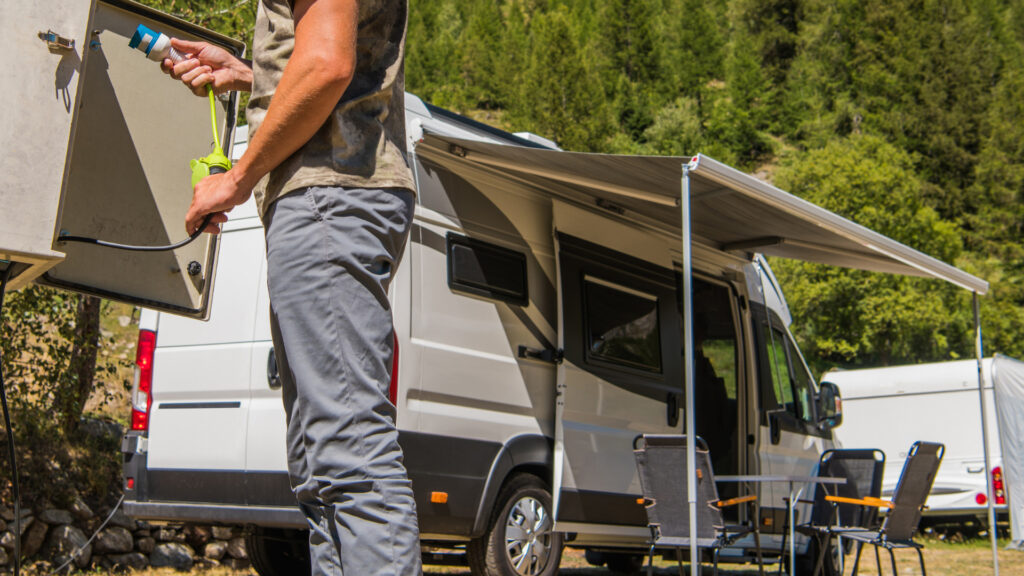
Use a Surge Protector (With EMS)
A surge protector is a great way to inspect the connection at a campsite. These devices can identify bad power sources before you connect your RV to it. We recommend taking it further and investing in a surge protector with an EMS.
Standard RV surge protectors keep your rig safe from surges. However, one with an EMS will also protect against voltage drops. If the conditions are no longer safe for your RV, it’ll automatically shut down to avoid any issues.
Additionally, it’ll continue to monitor the status and wait until it’s safe again. When it is, it’ll restore service without you doing anything.
- Package Dimensions: 21.09 L x 10.59 H x 18.29 W (inches)
- Package Weight : 2.75 pounds
Know Your RV’s Electrical Capacity
One of the most fundamental things you need to know about your RV is its power capacity. If you have a 30-amp RV, you can’t use more than 3,600 watts. It doesn’t matter if you plug into a 30-amp or 50-amp source. The 3,600 watts is the maximum amount of power you can use at one time. This is important information for a couple of reasons.
For starters, it lets you know how much you have to work with. This can save you from overloading your electrical system and potentially causing damage. In addition, running out and flipping the breaker at the electrical pedestal will get old quickly.
The other reason for knowing your RV’s electrical capacity is to reserve campsites. Some campgrounds have sights that only offer 30-amp or 50-amp service. If you have a 50-amp RV, you’ll want to get a 50-amp site to use your appliances without managing your power.
Pro Tip: When you own an RV, you need to understand your RV Electrical Panel. Read this article to help better understand your electrical panel!
Monitor Power Usage
The easiest way to avoid power issues is to monitor your usage. This is typically only an issue if you have a 30-amp or a 50-amp RV connected to a 30-amp connection. You may not have enough capacity to run all your devices.
We’d be lying if we said we hadn’t made this mistake. We used a 30-amp connection for our 50-amp RV several times while traveling in our fifth wheel.
We would go to heat up something in the microwave and forget that we needed to turn the A/C off to run it. A few seconds into the microwave running, we would lose power completely because we tripped the breaker.
If this happens to you, don’t be too hard on yourself. It’s a mistake that just about every RVer makes. Luckily, all you have to do is go out and flip the breaker back on, then turn off whatever was using too much power.
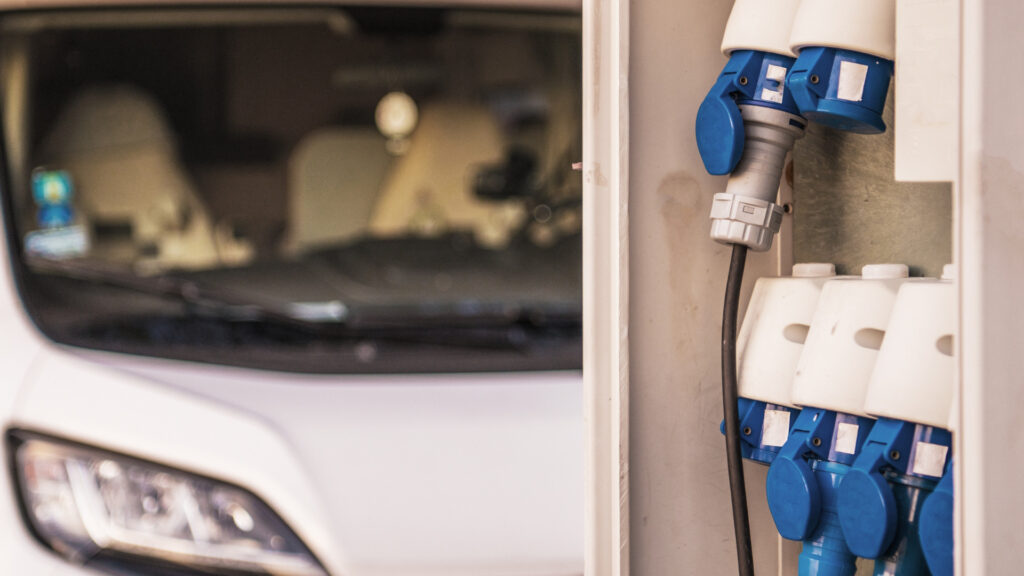
Avoid Using Long Extension Cords
Over the past few months, we’ve seen several pictures of melted electrical cords.
Using extension cords can be dangerous, especially if you push them past their capabilities. The longer the extension, the more power it will draw. Ensure you check the extension cord ratings and stay within them.
While many pedestals will trip the breaker if they detect an issue, these safety features can fail. If they do, it could cause a very dangerous situation for you and anyone camping near you. Unfortunately, when RV fires occur, there’s not much left once the smoke clears.
Install SoftStartRV on A/C Units
As we mentioned earlier, RV air conditioners require a lot of power to run them. However, SoftStartRV devices can allow you to run multiple air conditioners on a 30-amp connection. These products suppress the massive draw required from the AC compressor.
Unfortunately, you must purchase one for each unit if you have multiple air conditioners. However, they make it easier to manage power and allow you to use your RV in more places.
- HOW DOES IT WORK?: When your RV air conditioner compressor kicks in, it can overload your generator and trip the...
- WHAT SEPARATES US FROM THE COMPETITION? It’s NOW 40% smaller than all others, allowing it to fit in all Low-Profile...
Learn from This Campground Owner’s Advice
If you have a 30-amp RV, this campground owner’s advice is important to remember. If possible, consider using propane for your refrigerator and water heater. This will help ensure you don’t use too much electricity and blow a breaker while setting up your site.
Then you can enjoy your trip without interruption or any accidents. Electricity is a dangerous thing to mess with, even with safety measures in place.
Last update on 2024-07-25 / Affiliate links / Images from Amazon Product Advertising API




